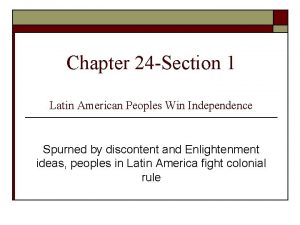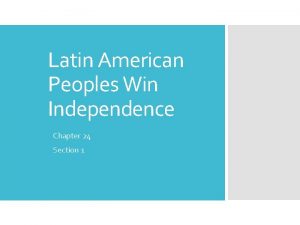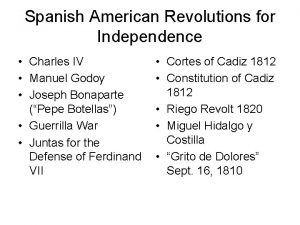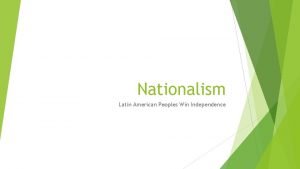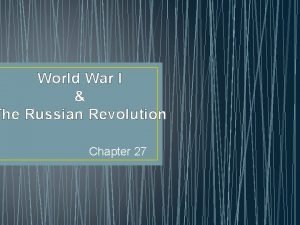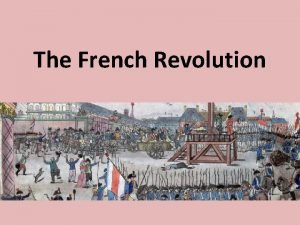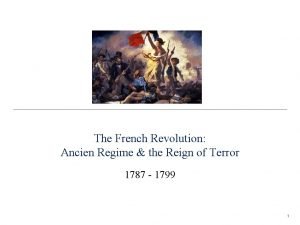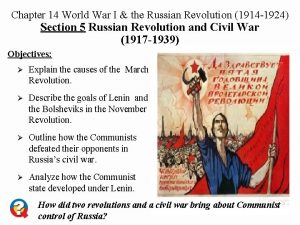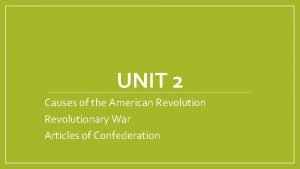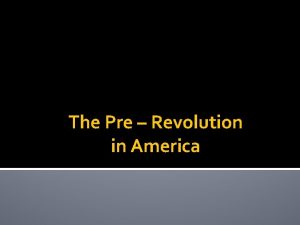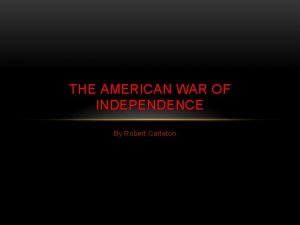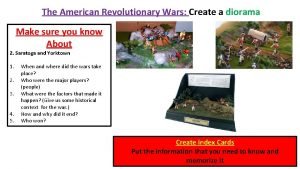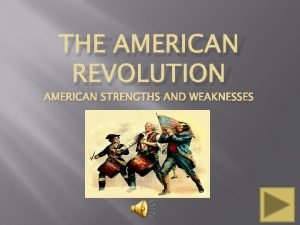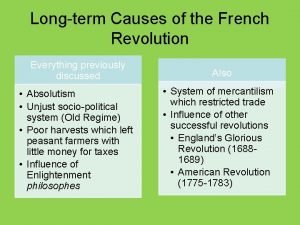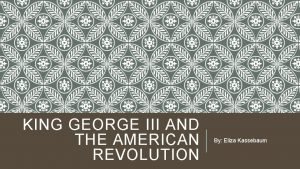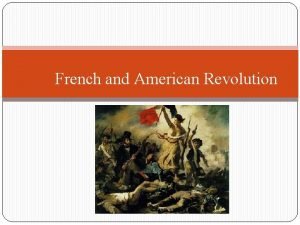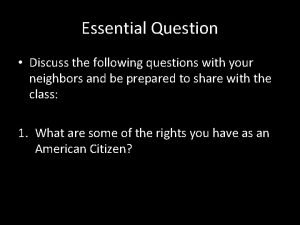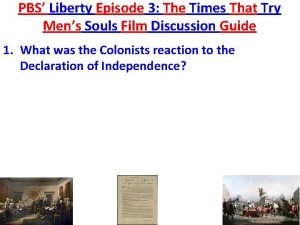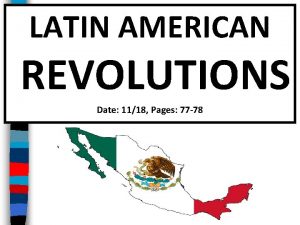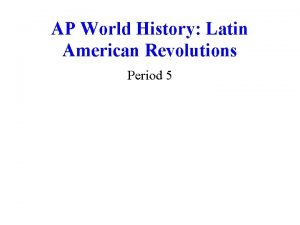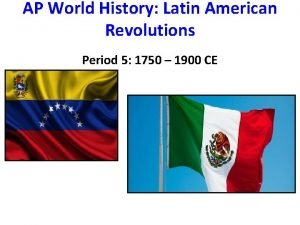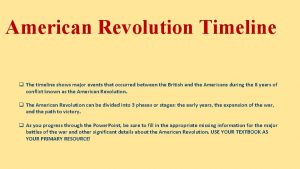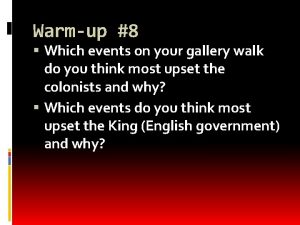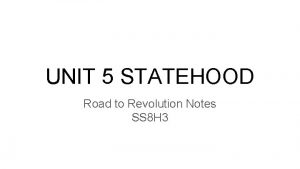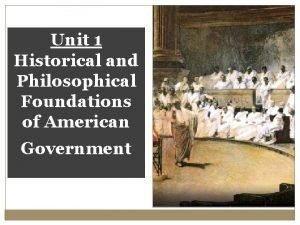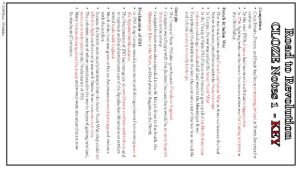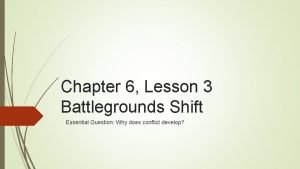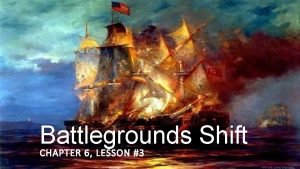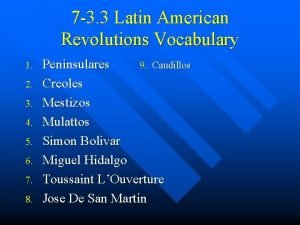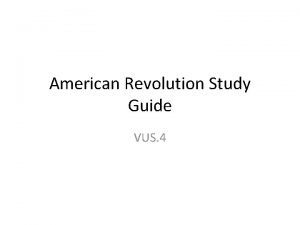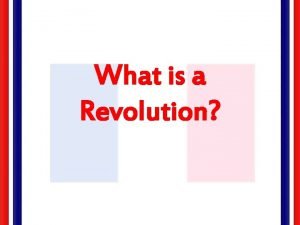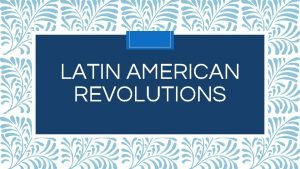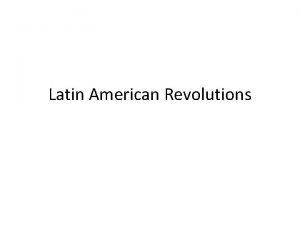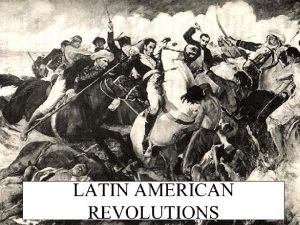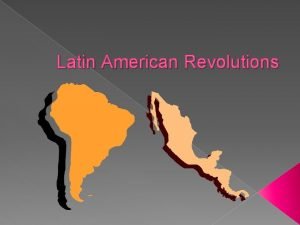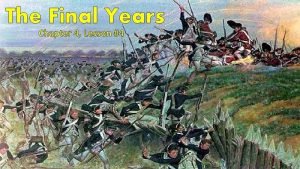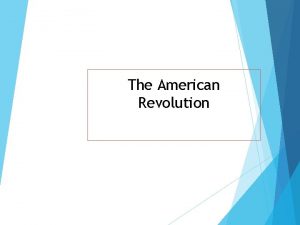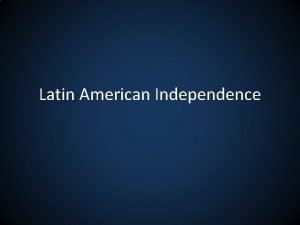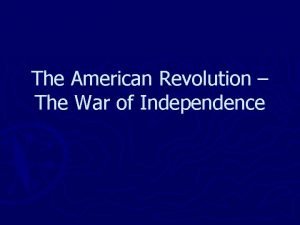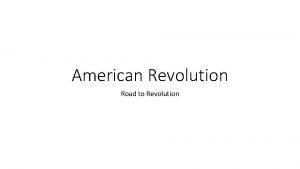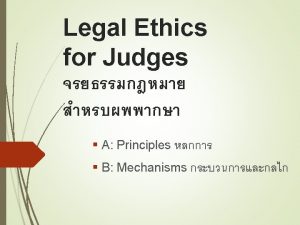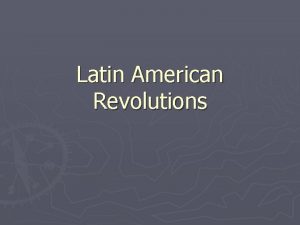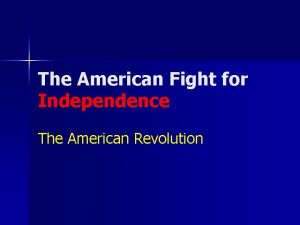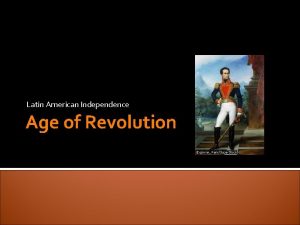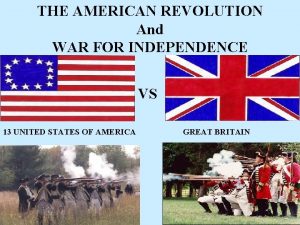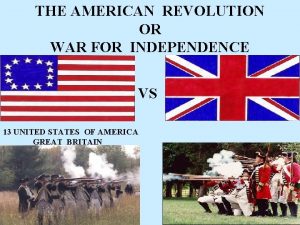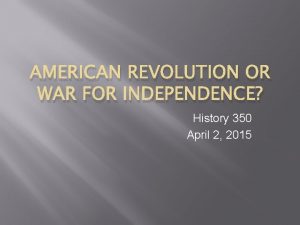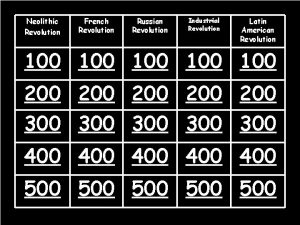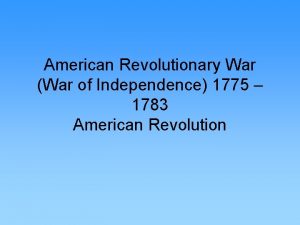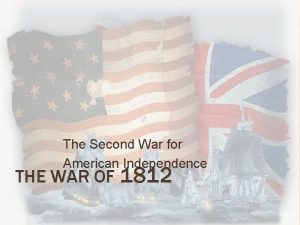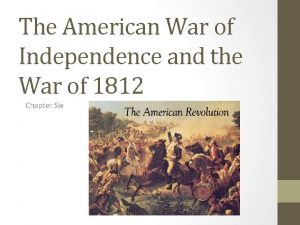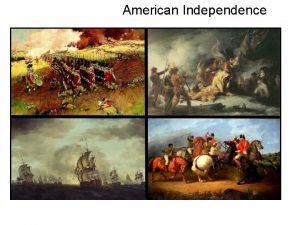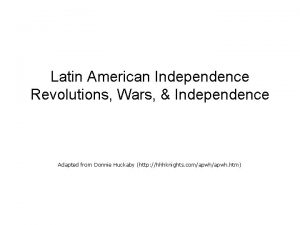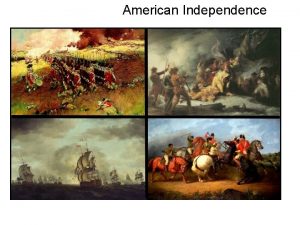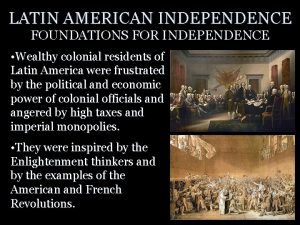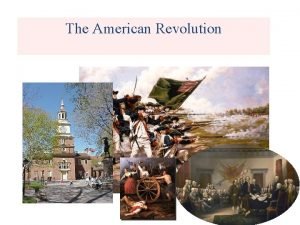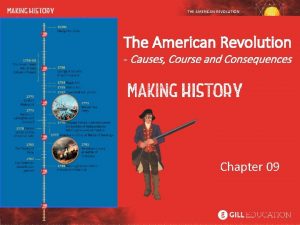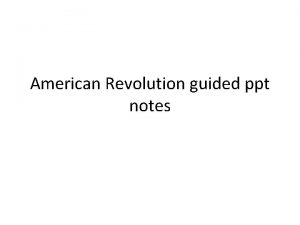The American Revolution The War for Independence No
















































- Slides: 48


The American Revolution The War for Independence

“No Taxation Without Representation!” � 1. � 2. What does this mean? What country controls the English colonies? � 3. Where do the colonists want representation? � 4. How many colonies are there? Do they make laws for themselves? Why? � 5. What should England do for the colonists? � 6. Why did this quote become a battle cry? � 7. How does this relate to the Tea Party Movement today?

I. Background A. French and Indian War ended in 1763 B. England (Great Britain) defeated France and controlled North America



C. Salutary Neglect—England did not enforce all laws of mercantilism during the war against France D. England needed money to pay for the war

E. Taxes raised on colonies: *Navigation Act *Stamp Act *Townsend Acts *Tea Tax *Intolerable Acts (punishment for the Boston Tea Party)

Stamp Act of 1765 � The purpose of the Stamp Tax was to raise revenue to support the British troops stationed in America and pay off debts incurred during French and Indian War � Issues: does Parliament have the right to tax the colonies and can Parliament truly reflect colonial interests? � Colonists demonstrated their willingness to use violence rather than legal means to frustrate British policy

� British claimed that the colonists were obligated to Parliamentary authority � The colonists claimed that the act denied them their British birthrights—the rights and privileges of all British subjects to representation in Parliament � The Stamp Act led to The Stamp Act Congress which was the first successful gathering of delegates from the 13 colonies � Colonial boycott of British exports led to the repeal of the Stamp Act

II. Colonial Rebellion A. Boycotts B. Sons of Liberty C. Committees of Correspondence D. Aggression toward Loyalists (Tories) and Redcoats

�E. Boston Massacre, 1770

F. Boston Tea Party

Coercive Acts--1774 � Called Intolerable Acts by Americans � Parliament’s Party response to the Boston Tea � Massachusetts lost power of the legislature, Port of Boston was closed until Tea Party damages were repaid � Included Quebec Act which denied access to lands except for French Catholics

D. Militias formed (“minute men”)

G. First Continental Congress created a colonial army led by George Washington

III. Revolution A. Lexington and Concord—first battle

From “The Concord Hymn” “By the rude bridge that arched the flood, Their flag to April’s breeze unfurled. Here once the embattled farmers stood, And fired the shot heard ‘round the world. ”

B. Thomas Paine published Common Sense encouraging the colonies to declare independence

Common Sense, 1776 � Thomas � Call Paine’s pamphlet for independence � Called for Republic over Monarchy � Addressed � Used loyalty issues to Britain Biblical imagery to persuade colonists— George III was called the Pharaoh!

C. Second Continental Congress declared independence on July 4, 1776 in Philadelphia—author was Thomas Jefferson of Virginia— 1 st signer was John Hancock D. https: //www. youtube. com/watch? v=u. Zf. Ra WAt. BVg


Declaration of Independence � Olive Branch Petition—last effort before Dec. of Ind. � Second Continental Congress—independence proposed by Richard Henry Lee � Presider was John Hancock � Committee for document was Jefferson, Adams, Franklin, … � Emphasized natural rights of man (see Jefferson’s list of unalienable rights) � Abigail Adams wrote her husband, John Adams to remember to include women among those who benefit from republican ideals of equality and individual rights

Excerpt of letter from Abigail to John Adams �“…and by the way in the new code of laws which I suppose it will be necessary for you to make, I desire you would remember the ladies, and be more generous and favorable to them than you ancestors…Remember, men would be tyrants if they could. ”

Reasons colonists supported the war � George III as tyrant � Parliamentary � Corruption � Wanted policies control of internal affairs of colonies of British ministers greater political participation in colonial � Resented quartering of British troops � Wanted to preserve local autonomy and way of life � Wanted trials held locally

Example of British Repression Grievance in Declaration of Independence Resolved by U. S. Constitution Quartering Act 3 rd Amendment Writs of Assistance 4 th Amendment Rights of the Accused 5 th, 6 th, 7 th Amendment

D. Battles included: *Bunker Hill (Boston, Mass. ) *Trenton (NJ) (Hessians on Xmas) *Saratoga (NY—turning point—France decided to help us) *Yorktown (surrender of England!)

French help �After victory at Saratoga �Financial assistance �French wanted to weaken British empire (not promote republicanism) �Influenced British to sign treaty ending conflict




Slaves �British enticed slaves to fight on the side of England in return for freedom �Some slaves fought with Americans in the hopes of living in a future free nation �Crispus Attucks was a former slave and first to die in the revolution at the Boston Massacre

E. French helped with Lafayette F. Treaty of Paris (1783)

Treaty of Paris, 1783 �(not to be confused with Treaty of Paris, 1763 ending the French and Indian War) �New boundaries of U. S. included Missisippi River on the West, Great Lakes in the North, and south to Spanish Florida �America agreed that Loyalists would not be further persecuted

Patriots (VIPs) �George Washington �Benjamin Franklin �Thomas Jefferson �John Adams �Sam Adams �Paul Revere

More Patriots… �Alexander Hamilton �Ethan Allen �Henry Knox �Benedict Arnold—later traitor! �Nathan Hale—spy �Patrick Henry �John Hancock

European Allies �Lafayette (France) �Von Steuben (Prussia) �Pulaski (Poland)

British Opponents �King George III �General Cornwallis �Loyalists �Redcoats �Hessians (German mercenaries)

New Government �Articles of Confederation, emphasized state authority with little power to the federal government








Answers to Class Set 1 -16 1. England defeated France in the French and Indian War. 2. England raised taxes to pay for the war against France. 3. A boycott is when people stop buying things as a sign of protest 4. The Boston Massacre 5. The Boston Tea Party 6. They dumped the tea so Americans would not buy it or pay taxes on it 7. Intolerable Acts 8. Minute men are men of the militia or volunteer army

9. Paine suggested that Americans declare independence from England. 10. John Hancock 11. Independence Day or our Declaration of Independence from England 12. Battle of Saratoga 13. Americans started winning the war and France decided to help us in the war 14. France 15. United States of America 16. United States of America
 You should hope this game will be over soon
You should hope this game will be over soon Tebhaga movement
Tebhaga movement Chapter 8 section 1 latin american peoples win independence
Chapter 8 section 1 latin american peoples win independence Latin american social classes
Latin american social classes Latin american peoples win independence
Latin american peoples win independence Spanish american independence
Spanish american independence Que países conforman la gran colombia
Que países conforman la gran colombia Latin american peoples win independence
Latin american peoples win independence Latin american peoples win independence
Latin american peoples win independence Russian revolution vs french revolution
Russian revolution vs french revolution The third agricultural revolution
The third agricultural revolution Chapter 27 world war 1 and the russian revolution
Chapter 27 world war 1 and the russian revolution France monarchy timeline
France monarchy timeline War with austria french revolution
War with austria french revolution Chapter 14 world war 1 and the russian revolution
Chapter 14 world war 1 and the russian revolution Main causes of the american revolution
Main causes of the american revolution Peter zenger american revolution
Peter zenger american revolution American revolution facts
American revolution facts Boston tea party diorama ideas
Boston tea party diorama ideas American revolution digital breakout answers
American revolution digital breakout answers American revolution strengths and weaknesses
American revolution strengths and weaknesses Wentworth cheswell
Wentworth cheswell Long term causes french revolution
Long term causes french revolution King during american revolution
King during american revolution American revolution effects
American revolution effects American french revolution venn diagram
American french revolution venn diagram Chapter 6 section 4 the american revolution
Chapter 6 section 4 the american revolution Liberty the american revolution episode 3
Liberty the american revolution episode 3 Latin american revolution date
Latin american revolution date American revolution jeopardy
American revolution jeopardy Monroe doctrine definition ap world history
Monroe doctrine definition ap world history Simon bolivar definition ap world history
Simon bolivar definition ap world history Road to american revolution timeline
Road to american revolution timeline Causes of the american revolution gallery walk
Causes of the american revolution gallery walk Road to revolution cloze notes 2
Road to revolution cloze notes 2 Philosophical foundations of the american revolution
Philosophical foundations of the american revolution Chapter 6 section 4 the american revolution
Chapter 6 section 4 the american revolution Colonial georgia cloze notes 1
Colonial georgia cloze notes 1 The american revolution lesson 3 battlegrounds shift
The american revolution lesson 3 battlegrounds shift Chapter 6 lesson 3 battlegrounds shift
Chapter 6 lesson 3 battlegrounds shift Latin american revolution vocabulary
Latin american revolution vocabulary Road to revolution study guide answer key
Road to revolution study guide answer key Symptomatic stage of american revolution
Symptomatic stage of american revolution Latin american revolution
Latin american revolution Latin american revolution
Latin american revolution Cause of the latin american revolution
Cause of the latin american revolution Latin american revolution
Latin american revolution Lesson 4 the final years
Lesson 4 the final years 10 uncomfortable truths about the american revolution
10 uncomfortable truths about the american revolution



